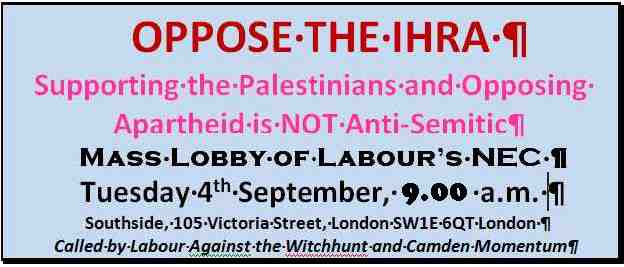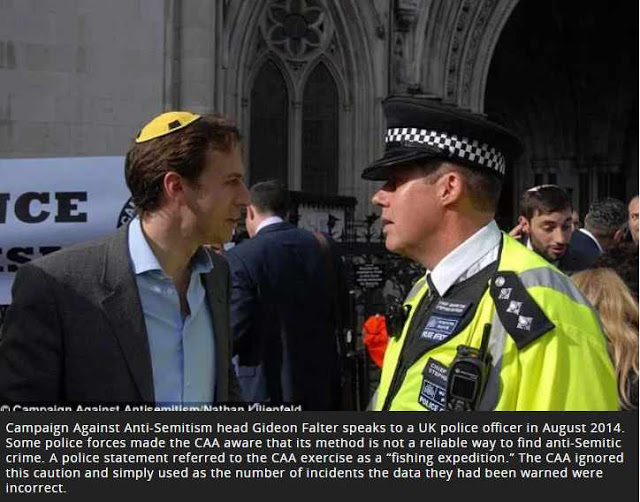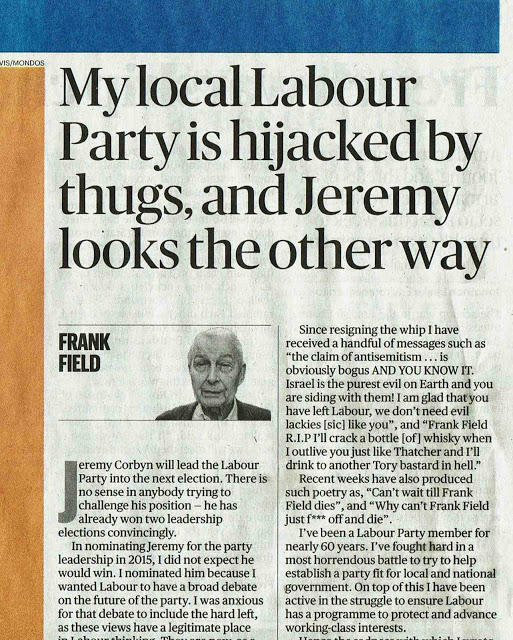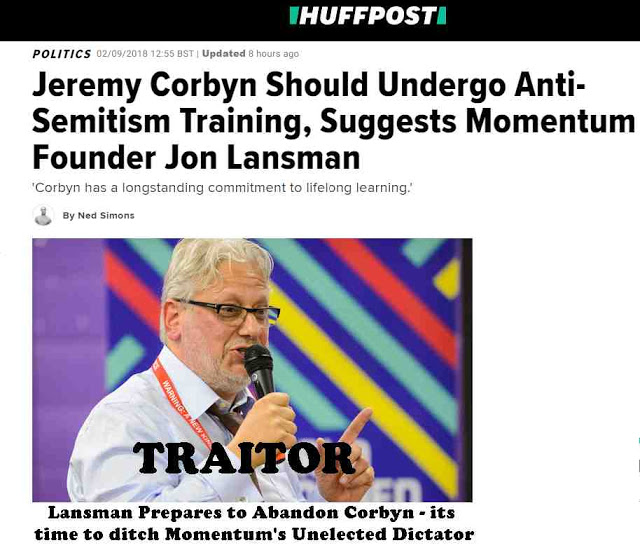The Labour Party is in danger of adopting a definition of anti-Semitism that is anti-Semitic and which has no legal, academic or logical rationale
Today we have had another
blast from the media on the theme of Labour ‘antisemitism’ and a contribution
at the Jewish Labour Movement [JLM] Conference from Gordon Brown calling on Labour to adopt the IHRA and remove the ‘stain’ of antisemitism from the Party. This is the same Gordon
Brown who proclaimed that his programme was British Jobs for British
Workers, the same slogan as that of the British National Party. Gordon
Brown defends ‘British jobs for British worker’ phrase.
today’s Sunday Times the Blessed Margaret Hodge is quoted as saying that Labour
is ‘consumed by a hatred of Jews.’. The answer to this hatred
was to ‘engage with Israel.’ At least there is no pretence any longer that the campaign over anti-semitism is really about Israel.


 |
| Gideon Falter of the McCarthCampaign Against Antisemitism which is the Campaign Against the Palestinians – a McCarthyite organisation |
the controversy about the International
Holocaust Remembrance Alliance Definition of Anti-Semitism is that its
defenders cannot defend it other than on grounds of expediency.
Officer of the Jewish Labour Movement, doesn’t argue for the IHRA on its
merits but because it will ‘rebuild
trust’ with the Jewish community. [Jewish
Labour Movement: There is no trust left] Zionist arguments for the IHRA are little
more than emotional blackmail. ‘Do what
we say or the Jewish community will have no confidence in the Labour Party.’
Even were this true then it would be irrelevant. Pandering to the fictional
notion of a monolithic Jewish community is no argument for adopting a
definition of anti-Semitism which would have deleterious consequences for free
speech.
against Corbyn were also used against Ed Milband, the Party’s first Jewish
leader. In October 2014 we were told that Maureen
Lipman was dropping her ‘longstanding
support for the Labour Party’ because Miliband had recognised a Palestinian
state. Over three years later Lipman was once again leaving Labour, claiming that Corbyn
had made her a Tory! The Times of Israel claimed in August
2014 that Miliband had a very Jewish problem. A few months later The Telegraph
was telling us that Labour’s first Jewish leader is
losing the Jewish vote. So we
have been here before. In fact the Jewish community deserted Labour long before
either Miliband or Corbyn became leaders.

Miliband is the vehemence of the campaign to ‘prove’ that the Labour Party is
anti-Semitic. At first the targets were people like Jackie Walker, Marc
Wadsworth, Ken Livingstone and myself. We were however metonyms for Jeremy
Corbyn, collateral damage. What is different about the current situation, from
the ‘mural affair’ in March onwards is how the focus has shifted to Corbyn
himself. In a joint editorial between 3 Zionist papers, it was claimed that a Corbyn
led government would pose an ‘existential
threat to Jewish life in this country.’
for the idea that Labour is anti-Semitic is Jonathan Freedland, gatekeeper at
The Guardian. I say dishonest because he deliberately misinterprets what the
IHRA says.
 |
| Frank Field and right-wing Labour MPs have been busy today attacking Jeremy and the left in the Tory press – but it is not only Frank Field and Margaret Hodge but Lansman too |
‘the only pro-Palestinian who needs to
fear the IHRA is the one who wants to say Jews are disloyal to their own
countries, that Jews are Nazis and that the very idea of Jews having a homeland
of their own is “a racist endeavour”.’
country comes from the Zionist movement which claims that Israel is a state
which represents all Jews, wherever they live and therefore all Jews owe
Israel their loyalty. Five years ago the Israeli Foreign and Immigrant
Absorption Ministries distributed questionnaires to tens of thousands of
American Jews asking
them ‘to indicate where their
allegiance would lie in the case of a crisis between the two countries.’
hence why anti-Zionist Jews are regularly accused of being ‘traitors’. Our opposition to the IHRA has nothing to do with support
for dual loyalty.
 |
| This is what Lansman effectively supports |
claimed that you can say anything about the
State of Israel All it prohibits is branding as a racist endeavour “a state of Israel” Again this is dishonest. It is clear that the reference in the IHRA is
to the existing State of Israel. This is confirmed by the succeeding example, ‘Applying double standards by requiring of it
a behavior not expected or demanded of any other democratic nation’. Clearly this refers to the actual existing Israeli
state not some abstract version.
from this last example that criticism of Israel is indeed circumscribed because
Israel is unlike any other nation.
It is an ethno-nationalist state in which Arabs are denied equal rights based
on their ethnicity. That is the very antithesis of democracy.
is also guilty of caricaturing his opponents. No one is defending the right to
say that Jews collectively are Nazis (although undoubtedly there are plenty of
Zionist Nazis). The IHRA defines as anti-Semitic ‘Drawing comparisons of contemporary Israeli policy to that of the Nazis’ so the IHRA forbids a comparison
between Israeli or Zionist policies with the Nazi state. Clearly Freedland is in need of a visit to
Specsavers.
editor Stephen Pollard branding
the Labour Party as ‘institutionally
anti-Semitic’ he let the cat out of the bag. It is not ‘anti-Semitism’ that concerned him
but that ‘Labour has excised the parts [of
the IHRA definition] which relate to
Israel and how criticism of Israel can be antisemitic.’
examine the IHRA definition of anti-Semitism to see why it has been criticised
by virtually all academics and legal professionals who have commented on it.
The actual definition itself is 38 words (minus 11 illustrations).
which may be expressed as hatred towards Jews. Rhetorical and physical
manifestations of anti-Semitism are directed towards Jewish or non-Jewish
individuals and/or their property, towards Jewish community institutions and
religious facilities.’
unnecessary. Why mention non-Jewish individuals or indeed Jewish community
institutions? Is anti-Semitism just a
perception and if it ‘may be’
expressed as hatred towards Jews what else might it be expressed as? What is a
‘certain perception’ and in whose
eyes? It is little wonder that the
following academics or lawyers make profound criticisms of the IHRA:
David Feldman, who was Vice-Chair of the Chakrabarti Inquiry and Director of the Pears Institute for the Study
of Anti-Semitism described
the definition as ‘bewilderingly
imprecise.’
Appeal is also Jewish. In Defining
Anti-Semitism he wrote that the IHRA ‘fails the first test of any definition: it is indefinite.’ In what
is the most concise critique of the IHRA, Sedley took it apart.
in the absence of definitional clarity, may seek to sanction or prohibit any
conduct which has been labelled by third parties as antisemitic without
applying any clear criterion of assessment.
human rights lawyer whose opinion is similar.
Robertson describes
the IHRA as
Government of Israel and advocacy of sanctions as a means to deter human rights
abuses in Gaza and elsewhere.
comes to genuine anti-Semitism, the
IHRA is actually very weak.
it fails to catch those who exhibit hostility and
prejudice – or apply discrimination – against Jewish people for no reason other
than that they are Jewish.
definition of anti-Semitism: ‘Hostility
to or prejudice against Jews’ catches attitudes that fall short of hatred. So
someone who says that he doesn’t hate Jews but he doesn’t want to live in close
proximity to them or have his daughter marry a Jew is not, by the IHRA
definition, anti-Semitic.
of all 11 illustrations of the IHRA. The IHRA consists of an introductory
paragraph, the actual definition itself in bold and boxed and then the eleven
illustrations preceded by an introduction which states that ‘Manifestations might include the targeting of the state
of Israel, conceived as a Jewish collectivity.’ Not only is this assertion tendentious but it
could equally be said that manifestations of anti-Semitism include support for
the State of Israel! Most anti-semites today support the State of Israel. Anti-Semites such
as the neo-Nazi founder of the alt-Right Richard Spencer, who declared that he
was a White
Zionist, hide their anti-Semitism behind support for Israel.
Stern is
the principal author of the IHRA. In written testimony to the US House of
Representatives Judiciary Committee he wrote that:
intended, as a tool to target or chill speech on a college campus. In fact, at
a conference in 2010 about the impact of the definition, I highlighted this
misuse, and the damage it could do.
misuse the way the Campaign Against Anti-Semitism targeted
a Bristol University lecturer Rebecca Gould.
Gould, a lecturer at the University of Bristol, has been caught red-handed
having written a sickening article about antisemitism.’
offence? Did she argue in favour of discrimination against Jews or that Jews
were mean or greedy? No, her ‘offence’ was to claim that the Holocaust has
been manipulated by government elites and that its primary victims are the
Palestinian people. Why is this anti-Semitic? Because ‘According to the International Definition of Antisemitism, “Drawing
comparisons of contemporary Israeli policy to that of the Nazis” is
antisemitic.’
to the University of Bristol demanding that Ms Gould be suspended. Here we can
see how the IHRA is a threat to academic discourse. The CAA is a charity that is
currently engaged in a campaign
to oust Jeremy Corbyn.
Zertal, an Israeli Professor of Political Science and History, wrote in her
book Israel’s
Holocaust and the Politics of Nationhood.
the Middle East reality… not only created a false sense of the imminent danger
of mass destruction. It also immensely distorted the image of the Holocaust,
dwarfed the magnitude of the atrocities committed by the Nazis, trivializing
the unique agony of the victims and the survivors, and utterly demonizing the
Arabs and their leaders. (p.100)
hasn’t been a war ‘that has not been
perceived, defined, and conceptualized in terms of the Holocaust.’ Israel
has mobilised the Holocaust ‘in the
service of Israeli politics.’ Clearly according to the CAA both Zertal and Gould
are anti-Semitic.
anti-Semitism in the IHRA are prefaced by an introduction which states that
life, the media, schools, the workplace, and in the religious sphere could, taking into account the overall
context, include…’
the kind of distortion that the CAA employs because none of these examples was
intended to be used as a definition of anti-Semitism but as an aid to data
collection.
illustrations to illustrate it is not much of a definition. The whole purpose of
a definition is that it stands alone. Because the IHRA definition defines anti-Semitism
in terms of ‘hatred’ then its 11 examples must also be evidence
of hatred.
1: Calling for, aiding, or justifying
the killing or harming of Jews in the name of a radical ideology or an extremist
view of religion.
harming of Jews is anti-Semitic, but why does it need to be ‘in the name of a radical ideology or an
extremist view of religion’? Would it be acceptable if the ideology was a
conservative or socialist one? This suggests that Islam is
the real target.
2: Making mendacious, dehumanizing,
demonizing, or stereotypical allegations about Jews as such or the power of
Jews as collective — such as, especially but not exclusively, the myth about a
world Jewish conspiracy or of Jews controlling the media, economy, government
or other societal institutions.
exceptional about this other than the fact that the reference to ‘Jews as collective’ elsewhere in the
definition refers to the Israeli state itself. As Geoffrey Robertson notes,
AIPAC, the Board of Deputies and similar Zionist groups define themselves as
Jewish. These bodies not only exercise power but they boast of so doing.
AIPAC is always talking up its achievements and boasting of how
influential it is.
3: Accusing Jews as a people of being
responsible for real or imagined wrongdoing committed by a single Jewish person
or group, or even for acts committed by non-Jews.
this is unexceptional but the OED definition more than adequately covers
instances of scapegoating.
4: Denying the fact, scope, mechanisms
(e.g. gas chambers) or intentionality of the genocide of the Jewish people at
the hands of National Socialist Germany and its supporters and accomplices
during World War II (the Holocaust).
Front’s Richard Harwood (Verall) wrote Did
6 Million Really Die then there was no doubt that holocaust denial was a
neo-Nazi phenomenon. That isn’t true today. Large numbers of people in the
third world doubt the Holocaust. In 2014
a survey of 53,000 people world-wide found
that only 8% of people in the Middle East or North Africa believed that
descriptions of the Holocaust were accurate and the corresponding figure in sub-Saharan
Africa is 12% and and 23 percent in Asia. Just over half of Middle Easterners
and a third of Asians and Africans think the numbers of dead have been exaggerated.
Is this an example of hatred of Jews? There is no evidence to believe
this. Doubt about the Holocaust is
directly related to Israel’s use of the Holocaust for propaganda purposes.
Because Israel uses the Holocaust to justify its existence as a racist state many people deny it. That was the position of Iran’s President Ahmedinajad. It
is a form of instrumentalism. Hindus
are the religious group most like to believe that the numbers who died in the Holocaust
have been exaggerated.
So today we have large numbers of people who are conspiracy theorists or just plain ignorant who deny the Holocaust. For that achievement we have the Israeli state propagandists and Zionism to blame.
5: Accusing the Jews as a people,
or Israel as a state, of inventing or exaggerating the Holocaust.
the previous example and it is framed to include Israel and the ‘Jewish people’ thus accepting that
Jews constitute one people. I’ve never heard Israel as a state being accused of
exaggerating the Holocaust. Another attempt to insert Israel into a definition supposedly about antisemitism.
6: Accusing Jewish citizens of being
more loyal to Israel, or to the alleged priorities of Jews worldwide, than to
the interests of their own nations.
example. It is Zionism which states that
Israel is the nation state of the Jews. If Jewish people are all nationals of
the Israeli state then that means they owe it loyalty. It is Zionism that is
guilty of accusing Jews of dual loyalty.
That is why anti-Zionist Jews are accused of being ‘traitors.’ It is also why the Israeli state surveyed American Jews to find out what they would do if there was a crisis in relations between the two states.
7: Denying the Jewish people their right to
self-determination, e.g., by claiming that the existence of a State of Israel
is a racist endeavor.
the IHRA is. There is no correspondence
between Jewish ‘self-determination’ and claiming Israel is a racist endeavour. It is a non-sequitur. It is perfectly possible to support Jewish national
self-determination and at the same time
believe that Israel is a racist state.
Historically
the idea that Jews are one nation, wherever they live, thus implying that British
Jews are not really British, was seen as an anti-Semitic idea and that is why Zionism
was a distinct minority of Jews before World War 2. What the Zionists were saying echoed that
which the anti-Semites said.
Lucien Wolfe, the Chair of the Conjoint Committee, effectively the Board of Deputies Foreign Committee wrote of the Zionist belief in Jews being a nation that:
my life in combating these very doctrines, when presented to me in the form of
anti-Semitism, and I can only regard them as the more dangerous when they come
to me in the guise of Zionism. They constitute a capitulation to our enemies…B
Destani (ed) The Zionist movement and the foundation of Israel
1839-1972 Cambridge
As Geoffrey Robertson says, the IHRA ‘brands’ as anti-Semitic
what is a political opinion.
8: Applying double standards by
requiring of it a behavior not expected or demanded of any other democratic
nation.
example of hatred of Jews. Apologists for Apartheid South
Africa used to ask why we were operating double standards. Why not criticize other Black African states, they said and the answer is the same. States that discriminate on the basis of race and unalterable characteristics are in a class of their own. The IHRA assumes
that people are guilty of ‘double standards’ if they single out Israel. Another instance of this definition’s
sloppiness is that it talks of a democratic nation, which is a racist concept
as it implies that some nations are not democratic. It is in essence a form of
special pleading dressed up as anti-Semitism.
9: Using the symbols and images
associated with classic antisemitism (e.g., claims of Jews killing Jesus or
blood libel) to characterize Israel or Israelis.
it is anti-Semitic. But this example brings Israel and Israelis into the
equation thus making clear that the purpose of this definition is defence of Israel
not Jews.
10: Drawing comparisons of
contemporary Israeli policy to that of the Nazis.
Ayatollah Khameini to Hitler. As Israel’s Ynet
noted ‘Prime Minister Benjamin Netanyahu compared Sunday the Iranian regime to
Nazi Germany.’ Margaret Hodge also compared the threat of disciplinary proceedings
to that of refugees fleeing from Nazi Germany. Because Israel claims that the Holocaust is
what gives it its moral foundations then it is appropriate to see whether
Israel is living up to that claim. Regardless there is no reason to believe
that people make such a comparison do so because
they hate Jews, which is the core of the IHRA.
11: Holding Jews collectively
responsible for actions of the state of Israel.
responsible for Israel’s actions is anti-Semitic but it is the Zionist organisations
such as the Board of Deputies who claim that British Jews support Israel’s
actions in Gaza and the West Bank. The Board
of Deputies organized demonstrations to support Operation Protective Edge in
2014. Israel calls itself the nation state of Jews, all Jews. Presumably then British
Zionist organisations are anti-Semitic!
of Deputies and Zionist Federation don’t want a debate to open up on the
IHRA. Instead they want the IHRA to be adopted
without debate because they know
that is intellectually and politically unsustainable.


